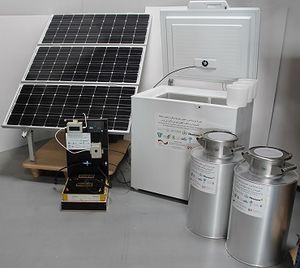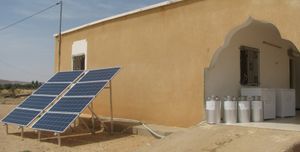Difference between revisions of "Solar Milk Cooling with Insulated Milk Cans"
***** (***** | *****) |
***** (***** | *****) |
||
| Line 89: | Line 89: | ||
= Overview of solar milk cooling systems = | = Overview of solar milk cooling systems = | ||
| − | [[Solar | + | [[Solar Milk Cooling|Solar Milk Cooling]] |
| + | [[Category:Powering_Agriculture]] | ||
| + | [[Category:Cooling]] | ||
[[Category:Photovoltaic_(PV)]] | [[Category:Photovoltaic_(PV)]] | ||
| − | |||
| − | |||
Revision as of 12:51, 4 July 2016
Description
The milk cooling solution developed by the University of Hohenheim is based on a commercially available DC Refrigerator equipped with an adaptive control unit for its conversion to a smart ice-maker that operates depending on the availability of solar energy. The ice-maker has a volume of 160l and is capable of producing approx. 8-13 kg ice per day. One system includes 25 reusable plastic blocks of 2 kg capacity and two 30l isolated milk cans with removable ice compartment. To cool down 30l of milk from 36°C to 15°C in one of the supplied milk cans, the systems needs 6kg of ice and 90 minutes.
The smart ice-maker is powered by 600Wp solar PV modules together with two batteries with a total capacity of around 1.5kWh. Thanks to the thermal energy storage, in form of the 25 2kg-Ice-blocks, the system is able to run autonomously for up to 7 days even during periods of low solar radiation and high ambient temperatures.
Ice-Maker with Adaptive Control Unit
Ice making rate is adapted to solar energy availabily. During night or rainy days, the total of 50 kg ice stored are kept frozen and ready for its use in the isolated milk cans.
Isolated milk cans
Capacity: 30 liter milk and 8 Kg Ice
Material: Stainless steel
Weight: 10 kg including ice-compartment and isolation
Thermal isolation: Milk increases its temperature 0.2 °C/hour (Ambient temperature 35°C, Milk temperature 15°C)
Preservation of Milk Quality through Cooling
- For 6 hours during transportation to milk colecting center
- At 15°C for a maximum of 30 L Milk (6 kg ice needed)
- Milk quality*: Around 15% bacterial growth after 4h ( compared to 120% bacterial growth of uncooled milk in the same time)
- For 12 hours for on-farm storage of evening milk
- At 8°C for a maximum of 20 L Milk (8 kg ice needed)
- Milk quality*: Around 90% bacterial growth after 12h ( uncooled milk spoiled after around 7 h)
*Orientative values based on laboratory measurements. Update with on-field values will follow.
Collaboration partners
Institute of Agriculture Engineering of the University of Hohenheim
Phaesun GmbH
International Center for Agricultural Research in the Dry Areas (ICARDA)
Tunisian Ministry of Agriculture (INRAT, OEP, CRRA)
German International Cooperation Agency (GIZ)
Supported by:
Innovation Transfer into Agriculture - Adaptation to Climate Change (ITAACC)
Powering Agriculture - Sustainable Energy for Food
German Ministry for Economic Cooperation and Development (BMZ)
On-field implementations
- Tunisia, July 2015 until December 2017:





















